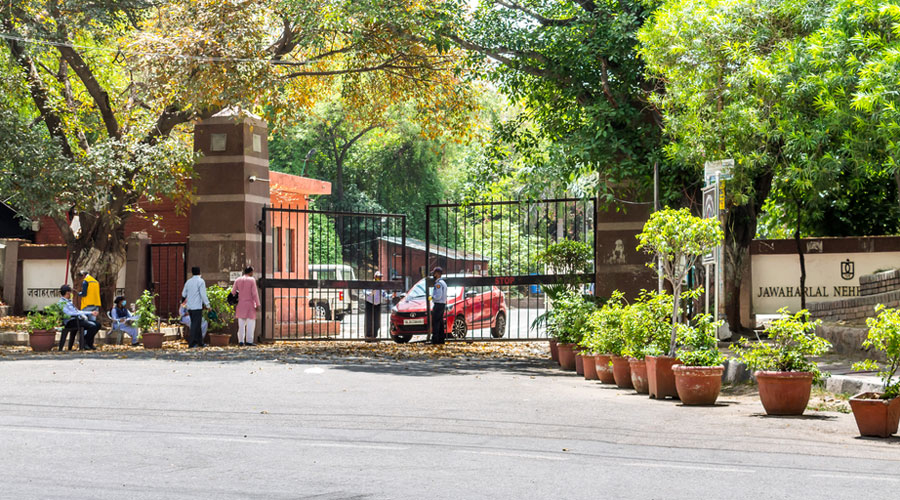The suspension of Delhi University vice-chancellor Yogesh K. Tyagi has prompted teachers at several other central universities to ask why the government isn’t acting against their VCs whom they accuse of similar “misgovernance”.
President Ram Nath Kovind suspended Tyagi last week on “misgovernance” charges that include long delays in the appointments of a registrar, pro-VC and other key officials.
But Visva-Bharati in Bengal and Pondicherry University have not had a regular registrar or finance officer for years, either. Visva-Bharati has not had a regular registrar since August 2015 and no regular finance officer since January 2016.
Nor have teachers and other staff at Visva-Bharati received their salaries for October, which should have been paid on the last day of the month.
“The salaries have been delayed mainly because of the absence of regular officers in key positions in the university,” a teacher said.
When they receive their October salaries, most of the staff will forgo half a day’s pay because the administration, headed by VC Bidyut Chakrabarty, has decided they should contribute to the upkeep of the Upasana Griha, the campus temple.
Those unwilling to pay were asked to inform the administration in writing, an option exercised by only a minority, two teachers said.
“The university should have asked the Centre to provide the money to protect the heritage structures on the campus. There’s no reason to ask teachers and other staff to bear the cost,” a teacher said.
“But most have agreed to pay because they don’t want to confront the administration for fear of victimisation. The teachers have written to the education ministry about all the examples of misgovernance here, but no action has been taken against the VC.”
Some senior academics have, however, argued that the many VCs facing accusations of mismanagement, high-handedness or corruption were all appointed because of their ideological loyalty to the Sangh-BJP and that they face action only if they fall foul of the ruling establishment.
The Shri Lal Bahadur Shastri National Sanskrit University in Delhi has had no regular registrar for about three years. The university’s finance officer has been doubling as the registrar.
After masked men entered Jawaharlal Nehru University early this year and assaulted students and teachers who were protesting a proposed fee hike, vice-chancellor M. Jagadesh Kumar’s role came under the spotlight. Students and teachers say he neither visited the injured nor explained how the intruders entered the campus despite security at every gate.
Kumar also stands accused of violating recruitment norms by, for example, changing the eligibility criteria after job advertisements were published and just ahead of the interviews, and by failing to invite to teacher selection panels the experts recommended by the varsity’s centres and schools.
The JNU teachers’ association has complained three times to the education ministry against the VC but received no reply.
Also, JNU has allowed science research scholars — but not those from the arts and social sciences — to enter the campus with the permission of their supervisors to meet them and use the laboratories.
The administration has cited home ministry guidelines about phased reopening of the campuses to justify the decision.
Some teachers have called this discriminatory, saying it’s hurting the arts and social sciences research scholars by denying them the opportunity to meet their guides or finish writing their theses in time.
“I have three research scholars under me who will have to submit their theses in December,” said Moushumi Basu, member of the JNU executive council.
“Two of them want to return to the campus to continue their work. They have their material and data in the hostels. The authorities should allow the entry of all the students. The present policy is discriminatory.”
The JNU teachers’ association issued a statement last week questioning the education ministry’s silence on the complaints against the VC.
“JNU faculty can thus legitimately ask why the department of higher education has remained a mute spectator to the systematic destruction of one of India’s premier universities and the unique synergy of academic excellence, social equity and democracy that became its hallmark,” it said.
An email sent to the education ministry on Monday had evoked no response till Wednesday evening.










